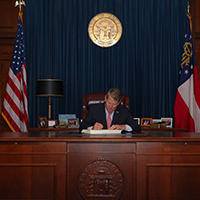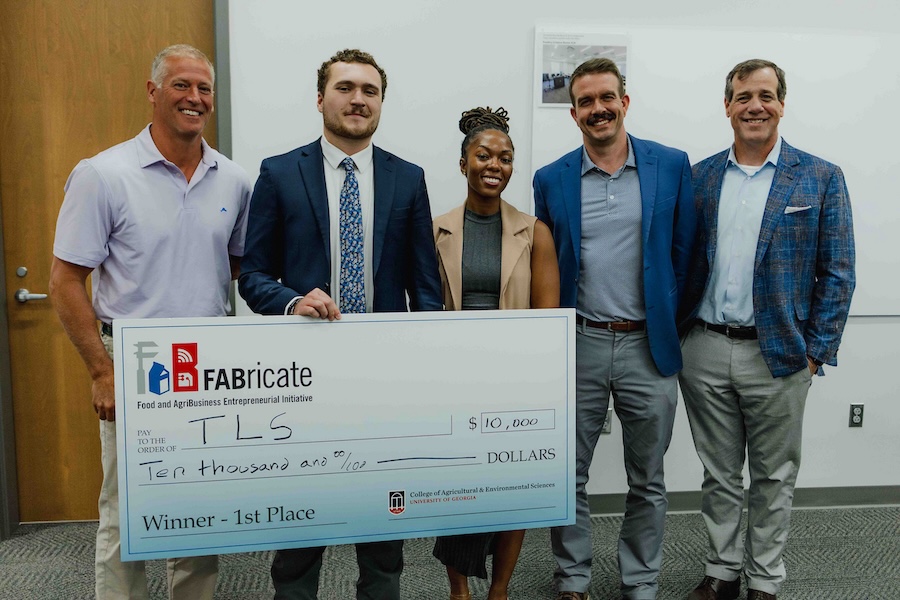Gov. Brian Kemp signed the fiscal year 2022 budget for the state of Georgia on Monday, May 10, securing $21.7 million for the construction of phase one of a new Poultry Science Complex on the University of Georgia’s Athens campus.
The project will increase the size of the Department of Poultry Science’s existing facilities in UGA’s College of Agricultural and Environmental Sciences (CAES) to 75,000 square feet, expanding instructional and lab space; providing modern, student-centered facilities; and helping to attract and retain world-class researchers.
“The new building will feature facilities and equipment to provide for advanced research to keep Georgia at the forefront of forward-thinking, relevant poultry research, advancing its UGA Cooperative Extension and outreach programs,” said Todd Applegate, head of the Department of Poultry Science. “This will keep staff on the cutting-edge to ensure that industry and government entities increasingly seek them out to address research questions. It will also strategically provide UGA with a competitive advantage in terms of attracting extramural funding to lead innovation to solve grand challenges facing the poultry sector.”
State-of-the-art learning labs will bolster the traditional classroom experience with production courses, demonstrations and relevant field-learning exercises and contribute to the department’s expanding FFA, 4-H and other youth programs, as well as assist with student recruitment efforts.
“The demand for poultry continues to grow with each new generation and the University of Georgia is committed to attracting the best and the brightest, and developing them into future leaders,” Applegate added.
The Poultry Science Complex building campaign is a public-private partnership, and the recent commitment from the Georgia legislature and Gov. Kemp marks their second and largest phase of public support of the project, which has an estimated total project budget of $54.1 million. Construction is scheduled to begin in spring 2022 with completion in fall 2023.
Ranked the No. 1 poultry science program in the nation, the CAES Department of Poultry Science has been a major contributor of research and university-trained experts that have led to the exponential growth of the state’s industry for many decades. The department and its faculty are well-known for their industry-focused innovation.
The first phase of funding for the project came during the current fiscal year, with $2.2 million allocated from the state for the design of the new Poultry Science Complex. A final capital budget request of $3.2 million to equip the building is slated to be included in the University System of Georgia’s fiscal year 2023 capital budget request.
Private fundraising is underway for the project, said Mary Ann Parsons, senior director of development for CAES.
“Private gifts are critical to complete funding for the Poultry Science Complex and will enable us to grow the industry workforce, improve the learning environment for our students and solve some of the greatest challenges we face as a state, nation and global community into the future,” Parsons said. “I join our college leadership and the building steering committee in celebrating the industry leaders, alumni and friends who have given financial support to this building in our initial efforts and welcome the interest of those who want to be a part of this important advancement at UGA.”
To make a gift to the Poultry Science Building Fund, contact Parsons at (706) 542-3390 or visit the CAES giving page.
The fiscal year 2022 budget, which was passed by the Georgia General Assembly on March 31, also includes $5 million for the design, construction and equipment for a new Multidisciplinary Greenhouse Complex on the UGA Athens campus. This greenhouse project will help bridge the gap between laboratory and field experiments, supporting research within CAES.
“We are so thankful for the support of our governor and state legislature for these critical projects. These funds will ensure that our facilities are capable of producing high-quality results in both horticulture and poultry research, along with providing increased opportunities for hands-on learning for our students in labs and greenhouses,” said CAES Dean and Director Nick Place. “Increasing our capacity for innovative research in agricultural and environmental sciences allows CAES to continue serving these industries, our state, and ultimately the world as we develop cutting-edge technologies and practical solutions.”








